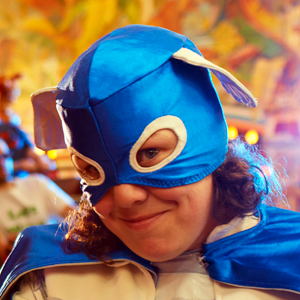
Anna
@ankari
Followers
754
Following
43K
Media
107
Statuses
5K
Training Coordinator @boptheatre | Learning Disability, Autism & Neurodivergence Policy Officer | she/they | disabled, most probably tired
Joined February 2009
Either leaving or deleting my account here. I very much doubt that anyone minds, but if you do, feel free to DM me so we can stay in touch.
0
0
0
incredible what can happen when working class young people in this country are actually given access to the arts
161
11K
189K
New “trains of the future” will have self-balancing snack tables and cinema-style onboard entertainment, but wheelchair users still won’t be able to board independently. An enraging reminder that we disabled people live in a different universe than our nondisabled peers.
10
199
685
Very excited to have published my first paper from my PhD research on #BlueBadge accessible parking encounters in @FrontSociology, looking at how disabled people have to manage their own & other's emotions during these encounters Please read and share, the article is open access
New Research: Walking on eggshells: disabled people's management of emotions during everyday encounters in accessible parking spaces https://t.co/W7dFs9zyrS
#FrontiersIn #Sociology
2
37
61
The Government of Israel must lift the siege and allow the safe, unobstructed delivery of aid across Gaza. Every child should have safe access to the essential humanitarian aid and services they need to survive. The denial of humanitarian aid is a crime and a grave violation
61
695
1K
Good on @turn2us_org for putting together a guide for journalists reporting on the benefits system. With the PIP vote coming up, there’s no excuse for the media to use inaccurate or stigmatising language.
35
678
1K
Children in Gaza wish they were dead. Keir Starmer, David Lammy: read that line again. The depths of human suffering felt by children in Gaza are immeasurable. No child should experience even a second of these horrors, let alone 20 months. Yet, the UK continues to transfer
104
1K
2K
No one should have to risk their life to collect life-saving aid. Humanitarian aid must be safe, impartial, and based on need. It should not be a dehumanising or life-threatening experience. We are on the ground in Gaza, as we have been for decades, ready to deliver
52
527
1K
Hi, I'm currently looking into the impact of the PIP cuts on carers for the Big Issue: I'm interested in speaking to anyone receives PIP *and* Carer's Allowance, and who is potentially at risk from the new "four point rule" please RT for circulation
25
491
367
Jodey Whiting - a 42 year old disabled mum - died in 2017, leaving a note saying she had no food money. Now, an inquest has ruled Jodey killed herself after her benefits were “mistakenly stopped by the DWP.” Thoughts to Jodey’s mum who fought for justice.
theguardian.com
Rare second inquest hears that Jodey Whiting, 42, left notes saying she had no food and could not pay bills
18
596
1K
women in HAMSTER (humanities, art, music, social sciences, theatre, economics and rhetoric)
194
32K
185K
We’re working with the amazing folks at @GoodChanceCal to host a costume trainee this autumn. It’s an opportunity for someone from an asylum seeking or refugee background who has an interest in theatre and costume - join us!
📣 Vacancy Alert We’re offering a part-time costume traineeship In partnership with @GoodChanceCal for someone from a refugee or asylum-seeking background. You’ll join our team this autumn as we bring Cinderella: A Fairytale to life. More info here: https://t.co/cntBJfrJHB
0
6
7
Disabled peers have told a committee of MPs that they face a “daily fight” just to be able to do their job, because of their continuing battle against the access barriers within the House of Lords. https://t.co/saKgiPrz3G
disabilitynewsservice.com
Disabled peers have told a committee of MPs that they face a “daily fight” just to be able to do their job, because of their continuing battle against the access barriers within the House of Lords.…
13
398
782
Absolutely devastated to share the news that a decision by #AccessToWork to cut the support that enables me to work by 61% means that as of today I am not able to do my job. We are challenging the decision & our team will keep working but without the right support I can't work
I’m profoundly sad to say that as of today, I’ll no longer be able to do my job as co-artistic director of #Touretteshero because of a recent decision by #AccessToWork to cut my support by 61%. Read & share this post, the hardest I've had to write: https://t.co/4GA5gPaUp1 1/4
11
110
240
it would be cool if he decided not to inhabit the apostolic palace but instead to lead the church from chicago like the avignon papacy
6
5
132
Trans women are and will always be women 🏳️⚧️
170
76
396
It’s a tiny thing and hardly a big concern for anyone but FWIW Who Wants Normal? The Disabled Girls’ Guide to Life is a trans inclusive book. Disabled women know what it’s like to not meet society’s definition of womanhood. Love and solidarity to trans women, disabled or not.
41
98
642
I’ve visited this hospital, run by the Anglican Church. It was doing crucial work in impossible circumstances. It’s an affront to suggest that it harboured Hamas. I’m appalled by its destruction - on Palm Sunday, of all days. It’s a crime against humanity. Stop the destruction!
Israel Bombs The Only Christian Hospital In Gaza On Palm Sunday #NotAnotherChildNot AnotherHospital#
10
54
145






















